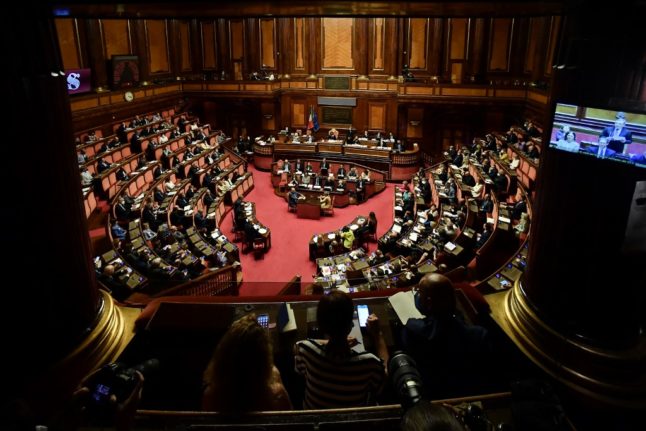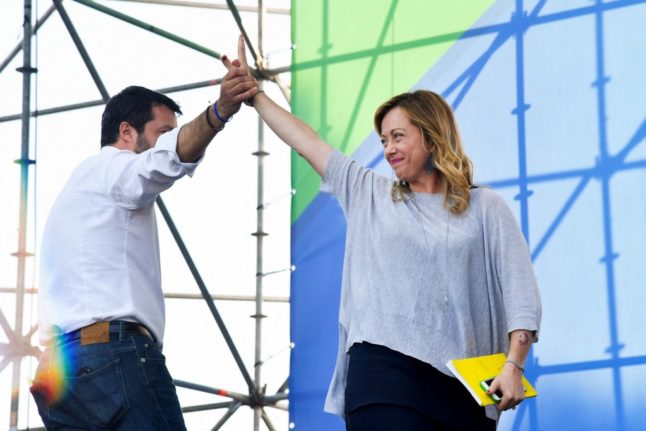The right-wing bloc of parties led by Giorgia Meloni’s post-fascist Brothers of Italy continues to enjoy a wide lead in the polls ahead of the September 25th general election, the latest surveys consistently show.
In fact, the question people in Italy are asking now is not whether the right will win the election, but by how much.
READ ALSO: Who is Giorgia Meloni, Italy’s likely next prime minister?
With other political forces divided, they’re close to achieving a two-thirds majority in both the Lower House and the Senate – a so-called super majority or absolute majority (maggioranza assoluta) that would allow it to make changes to the political system itself, and therefore the constitution, without consulting voters via a referendum.
The latest analysis shows the right-wing alliance, which also includes Matteo Salvini’s League and Silvio Berlusconi’s Forza Italia, is now just two or three percent away from achieving the share of the vote needed to potentially give it a majority of the seats in both houses of parliament.
The right is now 19 percent ahead of the centre-left bloc in the run up to the election, and needs a lead of at least 21-22 percent to secure a qualified majority in both houses, according to projections by Youtrend/CattaneoZanetto & Co.
📊 Sondaggio Quorum/YouTrend per @SkyTG24: centrodestra a +19 sul centrosinistra pic.twitter.com/A17Q14S8Wi
— YouTrend (@you_trend) August 29, 2022
The opinion polls used for the analysis put the right-wing bloc’s total current projected voter share at 48.5 percent, with the left-wing bloc led by the Democratic Party (PD) expected to take 29.5 percent.
The survey maps a recent poll of voting intentions by Quorum/YouTrend to recently-redrawn electoral districts.
READ ALSO: An introductory guide to the Italian political system
It highlights up to 67 seats in the lower house and Senate that are likely to be decisive in turning a landslide election victory into a right-wing majority in parliament.
Italy has a hybrid electoral system, which assigns a third of seats by first-past-the-post, and the rest in colleges based on proportional representation. It also has a drastically reduced number of seats available this time following recent reforms.
The right-wing alliance is projected to take as many as 271 seats out of 400 in the lower house, and 131 out of 200 in the Senate.
This is not an absolute certainty, analysts note. The likelihood of the right gaining this majority depends on the size of its lead.
READ ALSO: Italian elections: What are the main parties’ policies for foreigners?

A two-thirds majority is “possible” for the center-right “if the advantage in both chambers is around 21-22 percent,” Youtrend’s analysis explains.
Such a majority then becomes “probable” with “an advantage over the center-left of more than + 26 percent”, it says.
A political force achieving a majority large enough to change the constitution would be unprecedented in Italy’s modern history, and could mean major changes to the country’s political system – including to how the president is elected, or the powers the prime minister has.
All three leaders of the right-wing alliance have called for Italy to adopt a ‘French-style’ system which would mean the president is directly elected by voters,, instead of by lawmakers as is currently the case. This would require changing the constitution.
📈 Si sta discutendo molto sul vantaggio necessario al centrodestra per avere una maggioranza. A partire dalla Supermedia, abbiamo simulato le elezioni 10.000 volte: con il vantaggio attuale (+18,8%), il CDX otterrebbe fra 240 e 265 seggi alla Camera e 120-135 al Senato.
1/5 pic.twitter.com/QjdoABr5D2
— YouTrend (@you_trend) August 31, 2022
The projection of election results was based on a scenario in which PD refuses to form an alliance with smaller but significant parties, such as the populist Five Star Movement or centrist Italia Viva.
PD leader Enrico Letta on Friday insisted to reporters that a right-wing victory was “not a foregone conclusion” and said there was still “everything to play for”, following taunts from Salvini about the left knowing they were sure to lose.
With a massive 35-40 percent of voters still saying they’re undecided, according to polls, the results are far from set in stone.
Letta said young people in particular “have not yet decided who to vote for” – a belief that has apparently been driving party leaders to post a flurry of TikTok videos this week in an attempt to reach younger voters, with under-25s allowed to vote for senators for the first time in these elections following recent reforms.
READ ALSO: What election promises have Italy’s political parties made so far?
But while Italian politics is notoriously volatile and alliances near impossible to predict, the right’s large projected voter share, plus the left’s failure to form an equally strong alliance, mean a political force able to mount a credible opposition looks unlikely to emerge.
Even if PD and the left-wing bloc allied with both Five Star and Italia Viva – something it has so far ruled out – this would currently amount to around 41 percent of the vote: still some five percent behind the right.
But even if the hard right forms a government with an unprecedented majority, will it last long enough to put that power to much use?
Prominent politicians including Italy’s outgoing foreign minister, Luigi Di Maio, confidently predict that a Meloni-led government would barely last a year before falling apart – as Italian governments so often tend to within a relatively short space of time.
Find all The Local’s latest news on the Italian election race here.



 Please whitelist us to continue reading.
Please whitelist us to continue reading.
Very interesting article, thanks. Very clear except in one respect. I know I should get out more but it is important to distinguish between percentages and percentage points when reporting polls, surveys etc. For example, saying “The right is now 19 percent ahead of the centre-left bloc” is just incorrect. The right is actually 19 (percentage) points ahead of the centre-left.